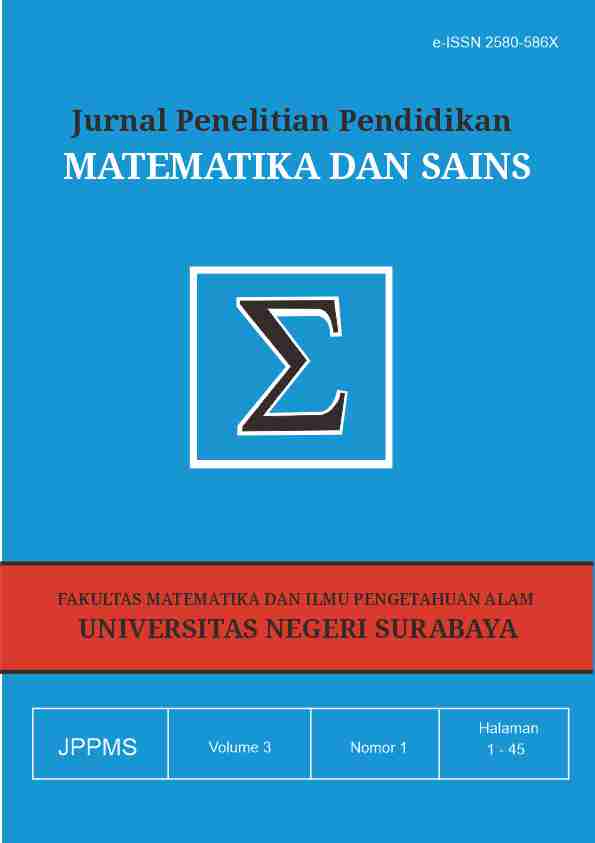Pengaruh Kecemasan Matematika dan Motivasi Belajar terhadap Prokrastinasi Akademik
DOI:
https://doi.org/10.26740/jppms.v3n1.p42-45Abstract
Abstrak ” Prokrastinasi adalah penundaan yang disengaja dalam mengerjakan suatu pekerjaan. Efek dari prokrastinasi dapat berakibat negatif pada emosi, mengakibatkan stress, dan akan mengganggu kegiatan sehari-hari. Jenis prokrastinasi yang berhubungan dengan kerja akademik adalah prokrastinasi akademik. Dengan mengingat pentingnya matematika dalam sehari-hari, peserta didik diharapkan dapat meminimalisir perilaku prokrastinasi akademik yang berefek negatif pada keoptimalan kerja akademik dan efikasi akademik pada matematika. Faktor-faktor yang dapat mempengaruhi tinggi rendahnya prokrastinasi akademik adalah kecemasan matematika dan motivasi belajar. Kecemasan matematika adalah kecemasan yang disebabkan oleh peristiwa yang berhubungan dengan matematika yang akan terjadi di masa yang akan datang. Sedangkan motivasi belajar adalah dorongan-dorongan yang membuat seseorang melakukan kegiatan belajar. Tujuan penelitian ini adalah untuk mengetahui pengaruh dari kecemasan matematika dan motivasi belajar terhadap prokrastinasi akademik. Dengan sampel 31 peserta didik SMAN 1 Krian, data dikumpulkan dengan menggunakan angket kecemasan matematika, angket motivasi belajar, dan angket prokrastinasi akademik. Pengaruh kecemasan matematika dan motivasi belajar terhadap prokrastinasi akademik dicari dengan menggunakan koefisien korelasi dan koefisien penentu. Koefisien korelasi berganda kecemasan matematika dan motivasi belajar dengan prokrastinasi akademik adalah 0,451 dengan koefisien penentu berganda 20,3%. Kemudian koefisien korelasi parsial kecemasan matematika dengan prokrastinasi akademik apabila motivasi belajar dikontrol adalah 0,423 dan koefisien penentu parsial sebesar 17,89%. Koefisien korelasi parsial motivasi belajar dengan prokrastinasi akademik apabila kecemasan matematika dikontrol adalah -0,141 dan koefisien penentu parsialnya adalah sebesar 1,98%.
Kata Kunci: kecemasan matematika, motivasi belajar, prokrastinasi akademik.
Abstract ” Procrastination is an intentional delay in doing activities. Procrastination can cause negative effects on emotions, stress, and interfering with everyday life. Procrastination type that related to academic work is academic procrastination. On a more important note, we need to keep in mind how important mathematics is in our lives and students are expected to minimalize academic procrastination behavior that could make academic works less optimal and negative effects on academic efficacy on mathematics learning. Many factors could contribute to academic procrastination levels. Two of them are mathematics anxiety and learning motivation. Mathematics anxiety is an anxious feeling caused by events related to mathematics that will happen in the future. Whilst learning motivation is the stimulus that drives a person to learn. The aim of this research is to find out the relationship between mathematics anxiety and learning motivation with academic procrastination. Using 31 students of SMAN 1 Krian as the sample, the data is gathered with a mathematics anxiety questionnaire, learning motivation questionnaire, and academic procrastination questionnaire. The multiple correlation coefficient of mathematics anxiety and learning motivation with academic procrastination is 0,451 while the coefficient of determination is 20,3%. The partial correlation coefficient of mathematics anxiety with academic procrastination is 0,423 while the coefficient of determination is 17,89%. Lastly, the partial correlation coefficient of learning motivation with academic procrastination is -0,141 while the coefficient of determination is 1,98%.
Keywords: mathematics anxiety, learning motivation, academic procrastination.
References
Bartlett, J. E., Kotrlik, J. W., & Higgins, C. C. (2001). Organizational Research: Determining Appropriate Sample Size in Survey Research. Information Technology, 19(1), 4350.
Cavusoglu, C., & Karatas, H. (2015). Academic Procrastination of Undergraduates: Selfdetermination Theory and Academic Motivation. Anthropologist, 20(3), 735743.
Demir, Y., & Kutlu, M. (2018). Relationships among Internet Addiction, Academic Motivation, Academic Procrastination and School Attachment in Adolescents. International Online Journal of Educational Sciences, 10(5), 315332.
Grunschel, C., Patrzek, J., Klingsieck, K. B., & Fries, S. (2018). œIll stop procrastinating now! Fostering specific processes of selfregulated learning to reduce academic procrastination. Journal of Prevention & Intervention in the Community, 46, 143157.
Hopko, D. R., Mahadevan, R., Bare, R. L., & Hunt, M. K. (2003). The Abbreviated Math Anxiety Scale (AMAS): Construction, Validity, and Reliability. Assessment, 10(2), 178182.
Karatas, H. (2015). Correlation among academic procrastination, personality traits, and academic achievement. Anthropologist, 20(1),
243255.
Liu, E. Z. F., & Lin, C. H. (2010). The Survey Study of Mathematics Motivated Strategies for Learning Questionnaire (MMSLQ) for Grade 1012 Taiwanese Students. The Turkish Online Journal of Educational
Technology, 9(2), 221233.
McCloskey, J., & Scielzo, S. A. (2015). Finally!: The Development and Validation of the Academic Procrastination Scale. ResearchGate.
Nitami, M., Daharnis, & Yusri. (2015). Hubungan Motivasi Belajar dengan Prokrastinasi Akademik Siswa. Konselor, 4(1).
Steel, P. (2007). The Nature of Procrastination: A Meta-Analytic and Theoretical Review of Quintessential Self-Regulatory Failure. Psychological Bulletin, 133(1), 6594.
Steel, P., & Klingsieck, K. B. (2016). Academic procrastination: Psychological antecedents revisited. Australian Psychologist, 51, 3646.
Suárez-Pellicioni, M., Núñez-Peña, M. I., & Colomé, À. (2016). Math anxiety A review of its cognitive consequences, psychophysiological correlates, and brain bases. Cognitive, Affective, & Behavioral Neuroscience, 16(1), 322.
Sunitha, T. P., & Musthafa, M. N. M. A. (2013). Relationship between Academic Procrastination and Mathematics Anxiety among Secondaru School Students. International Journal of Education and Psychological Research, 2(2), 101105.
Ziegler, N., & Opdenakker, M.-C. (2018). The development of academic procrastination in first-year secondary education students: The link with metacognitive self-regulation, self efficacy, and effort regulation. Learning and Individual Differences, 64, 7182.
 Abstract views: 1559
,
Abstract views: 1559
, PDF Downloads: 1682
PDF Downloads: 1682








